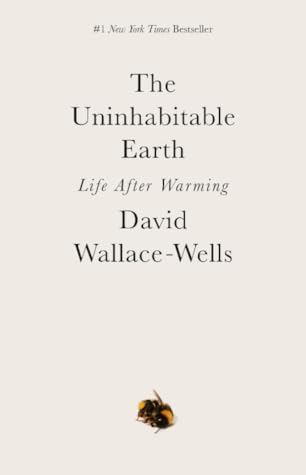More on this book
Community
Kindle Notes & Highlights
Read between
August 1 - August 9, 2019
Many perceive global warming as a sort of moral and economic debt, accumulated since the beginning of the Industrial Revolution and now come due after several centuries. In fact, more than half of the carbon exhaled into the atmosphere by the burning of fossil fuels has been emitted in just the past three decades. Which means we have done as much damage to the fate of the planet and its ability to sustain human life and civilization since Al Gore published his first book on climate than in all the centuries—all the millennia—that came before. The United Nations established its climate change
...more
This highlight has been truncated due to consecutive passage length restrictions.
As recently as the 1997 signing of the landmark Kyoto Protocol, two degrees Celsius of global warming was considered the threshold of catastrophe: flooded cities, crippling droughts and heat waves, a planet battered daily by hurricanes and monsoons we used to call “natural disasters” but will soon normalize as simply “bad weather.” More recently, the foreign minister of the Marshall Islands offered another name for that level of warming: “genocide.”
The United Nations’ Intergovernmental Panel on Climate Change (IPCC) offers the gold-standard assessments of the state of the planet and the likely trajectory for climate change—gold-standard, in part, because it is conservative, integrating only new research that passes the threshold of inarguability. A new report is expected in 2022, but the most recent one says that if we take action on emissions soon, instituting immediately all of the commitments made in the Paris accords but nowhere yet actually implemented, we are likely to get about 3.2 degrees of warming, or about three times as much
...more
The graphs that show so much recent progress in the developing world—on poverty, on hunger, on education and infant mortality and life expectancy and gender relations and more—are, practically speaking, the same graphs that trace the dramatic rise in global carbon emissions that has brought the planet to the brink of overall catastrophe. This is one aspect of what is meant by the term “climate justice.”
It has become quite common to say that we are living through a mass extinction—a period in which human activity has multiplied the rate at which species are disappearing from the earth by a factor perhaps as large as a thousand. It is probably also fair to call this an era marked by what is called ocean anoxification. Over the past fifty years, the amount of ocean water with no oxygen at all has quadrupled globally, giving us a total of more than four hundred “dead zones”; oxygen-deprived zones have grown by several million square kilometers, roughly the size of all of Europe; and hundreds of
...more
Twenty-two percent of the earth’s landmass was altered by humans just between 1992 and 2015. Ninety-six percent of the world’s mammals, by weight, are now humans and their livestock; just four percent are wild. We have simply crowded—or bullied, or brutalized—every other species into retreat, near-extinction, or worse.
There is one civilization we know of, and it is still around, and kicking—for now, at least. Why should we be suspicious of our exceptionality, or choose to understand it only by assuming an imminent demise? Why not choose to feel empowered by it?
The path we are on as a planet should terrify anyone living on it, but, thinking like one people, all the relevant inputs are within our control, and there is no mysticism required to interpret or command the fate of the earth. Only an acceptance of responsibility. When Robert Oppenheimer, the actual head of Los Alamos, later reflected on the meaning of the bomb, he famously said he was reminded, in the flash of the first successful nuclear test, of a passage from the Bhagavad-Gita: “Now I am become death, the destroyer of worlds.”
The threat from climate change is more total than from the bomb. It is also more pervasive. In a 2018 paper, forty-two scientists from around the world warned that, in a business-as-usual scenario, no ecosystem on Earth was safe, with transformation “ubiquitous and dramatic,” exceeding in just one or two centuries the amount of change that unfolded in the most dramatic periods of transformation in the earth’s history over tens of thousands of years. Half of the Great Barrier Reef has already died, methane is leaking from Arctic permafrost that may never freeze again, and the high-end estimates
...more


